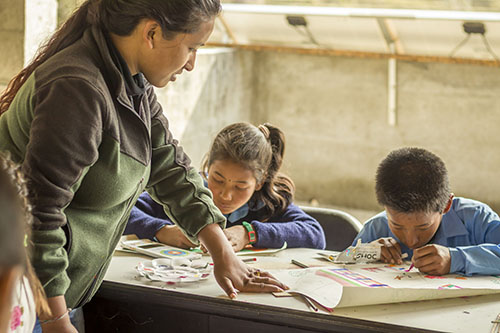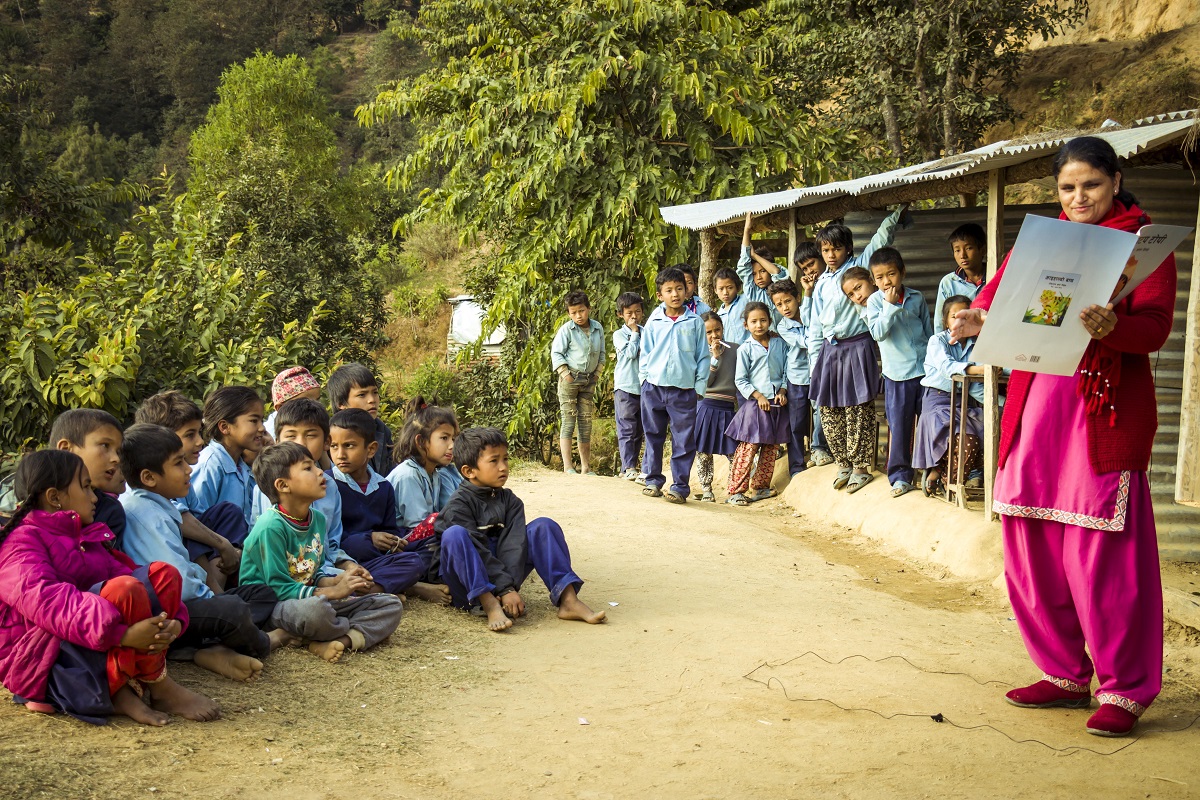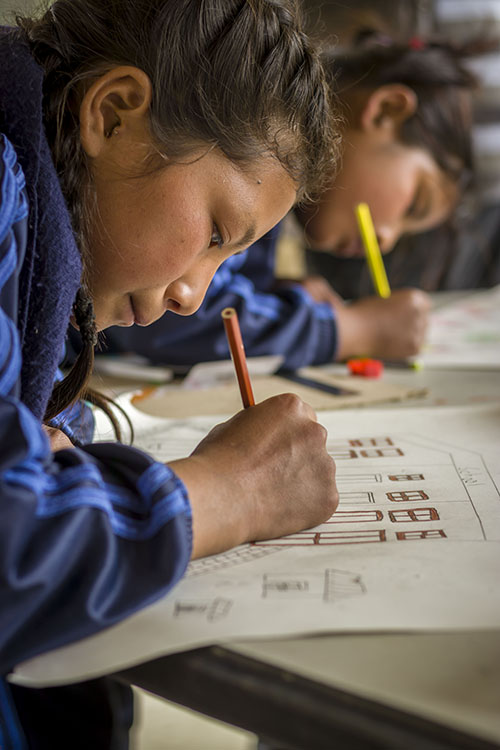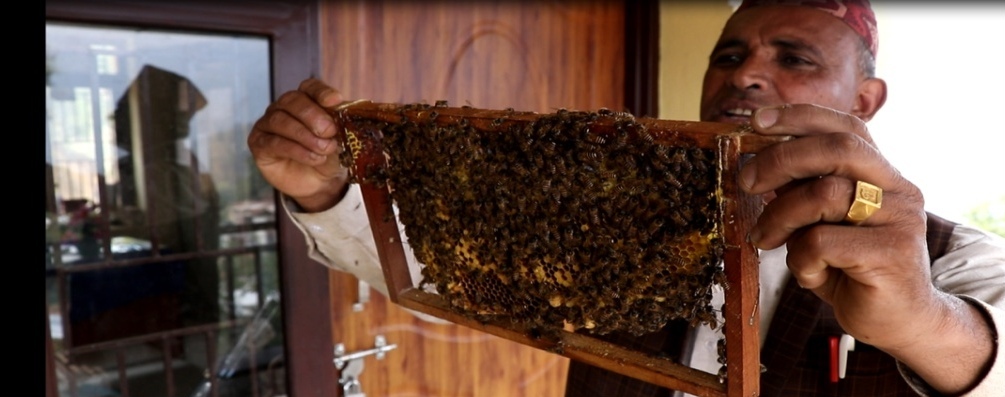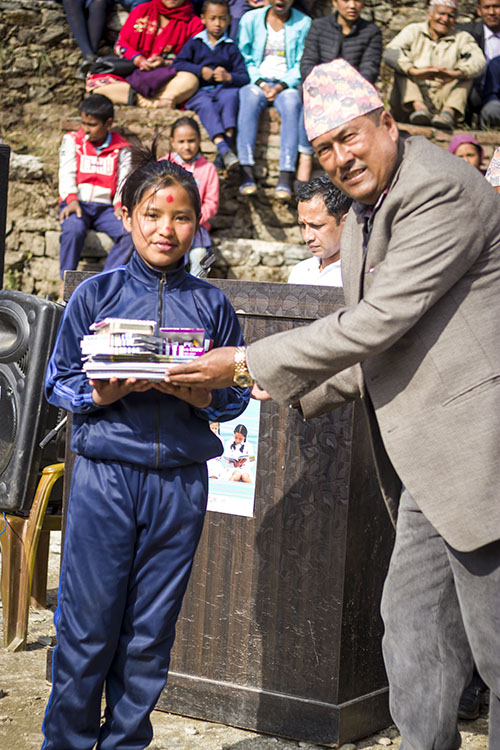Discovering a new book is exciting for readers of all ages, especially children. In Nepal, however, children’s books are scarce, despite a rich oral tradition of rhymes, stories and songs. Several publishers have begun to address the need, but teachers have no experience or training in how to read aloud to children as a learning activity.
Research shows that classroom read-aloud and independent reading are the most important predictors of future academic success for children. We want to improve literacy and spread the joy of reading to children in rural Nepal.
Together with our partner in Nepal, Kakshyalaya, we have developed a teacher training program to:
- introduce teachers to Nepali children’s literature
- train teachers in effective read-aloud techniques
- help teachers introduce regular read-aloud times into their daily schedules
We have installed classroom libraries with:
- books and bookshelves
- tables and carpets for reading corners
- policies to allow students to borrow books to take home
Covid-19 Update
During late 2020 and early 2021, we will conduct socially distanced workshops
with small groups of people. This is one way we are adjusting our typical practices to keep our work
going during the pandemic.
Make a Difference Today
How your donation will be put to work:
$25: bookmaking materials
$50: box of children’s books
$75: carpets and cushions for a reading corner
$100: low reading tables for young children
$150: classroom bookshelves
$250: one-day (socially distanced) read-aloud training workshop for 5-8 teachers
$500: classroom book corner (bookshelves, books, low tables and chairs, floor cushions)
$1,000: beehives for four schools (two for each)
Here are some of the ways our read aloud program makes a difference:
A Unique Program in Rural Nepal
We are committed to improving the quality of education for children in rural areas of the country. Where we work, in the Kathmandu Valley, our teacher training program is unique, because few organizations that share our philosophy offer training outside of big cities.
We also make a serious effort to support our teachers as professionals. Beyond offering free training sessions and classroom materials, we ask educators for their opinions. Some components of our training have come from suggestions by teachers and community members.
Simply put, teachers are the greatest resource at our schools. They are dedicated to their students and open to new ideas, like reading aloud. We recognize that they know their children best. We want to do whatever we can to help them and their students succeed.
Children’s Literature Festivals
Two-day literature festivals are the culminating event of our training program. They promote reading habits in students but also give parents and community members an opportunity to visit schools and learn more about the value of reading aloud with children.
Before the festival, we deliver books, bookshelves and reading tables along with packages of stationary and play materials like classroom blocks. Past festivals have attracted hundreds of people—school management committee members and local officials in addition to students, teachers, and parents.
Everyone is invited to read and make their own book as well as attend a ceremony recognizing the teachers who have completed our training.
We hope to resume festivals again in fall 2021.
Learning Beekeeping
It’s important to us to work with teachers and principals to provide learning activities that interest their students. Following a suggestion by two of our partner schools in Kavre district, we delivered two beehives and 10,000 bees to each campus.
We conducted several workshops to help students, teachers and local residents understand how honey is made, manage bee stings, and identify different beehive products.
“I want to thank the organization for being the first to bring much-needed help to one of the indigenous communities of the municipality,” says Rina Tamang, a teacher. “Most other communities have beehives in their houses, but not around here because people cannot afford it.”
“Learning about bees will help children educate their parents, who are mostly farmers, about using natural resources for farming so the bees are extracting nectar from natural sources.”
Making Books Together
As part of the practice of reading aloud in the classroom, we encourage teachers to create books with their students, using easily accessible materials like kite paper, fabric, cloth, thread and glue.
During training workshops, teachers have a chance to make their own books. Then they learn techniques for writing, illustrating and binding texts so they can conduct bookmaking activities with their students.
Teachers tell us students are better able to relate to each other and more confident about expressing themselves as a result of writing their own stories.
One teacher said she can see her students developing social and emotional skills with each read aloud and with each story. As the children learn about new characters and those characters’ feelings, they are able to share their own feelings with their friends.

